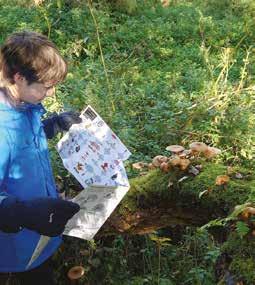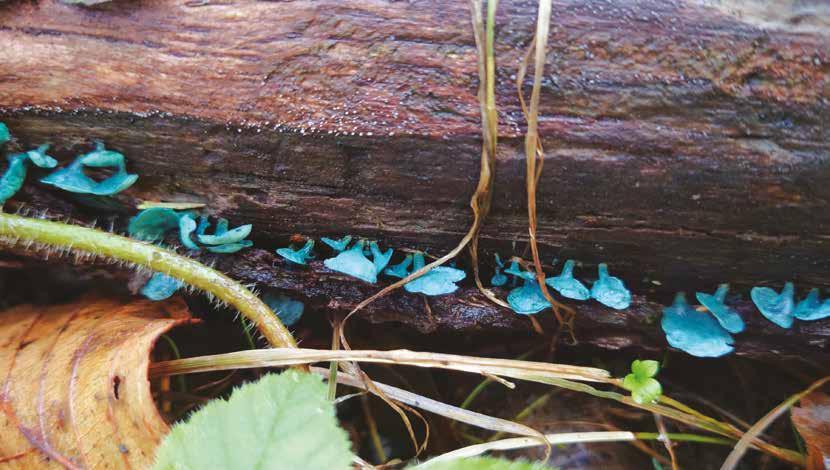
4 minute read
A fungi forage with the Rangers
Nature and Young Rangers are practical volunteering groups for young people, aged from 11 to 18 years. Sessions run regularly at Rainton Meadows and Low Barns Nature Reserves and offer participants the chance to gain some hands-on experience of managing a nature reserve and recording the wildlife. Activities include things like brush cutting, grass cutting and raking, litter picking, surveying and learning species identification skills.

Advertisement
This autumn, the groups at Low Barns went on a fungi forage under the guidance of one of the Trust’s expert education leaders, Jodie Morgan, who commented: “Amazingly, we found a total of 42 species of fungi during the forage, which was incredible! The species we spotted included a wood blewit, green elf cups, and honey fungus. It was wonderful to see the young members of our group so enthusiastic about this classic sign of autumn in wildlife and to have the opportunity to pass on some of my top tips for identification. “We are keen to see more members join our Rangers groups. The volunteering hours can count towards a Duke of Edinburgh Award and go down as work experience on curriculum vitae documents. Not only that, the young people are making friends, helping to do their bit for the environment and gaining invaluable experience if they wish to pursue a career in conservation.”
To find out more about our Rangers groups or book onto a session, visit durhamwt.com/events
Low Barns reedbed boardwalk out of action
As regular visitors to Low Barns will be aware, we unfortunately had to close the reedbed boardwalk in summer 2022. Over the years we have performed ongoing maintenance to ensure it is safe for visitors and events but, following an inspection, we have regrettably concluded that the boardwalk is no longer fit for purpose or cost effective to repair. Phill Catton, Conservation Manager, said: “We know that the boardwalk is popular with visitors to Low Barns, and it’s also an important part of school visits to the site, when it is used as a pond dipping platform. We’re busy exploring options to replace the boardwalk and re-open public access to the reedbed. We hope to have the work completed before spring 2023, but if funding delays or contractor availability makes that impossible, the work will have to be carried out in autumn 2023 to avoid disturbing nesting birds. Any donations to help us with this project would be gratefully received.”
Donations can be made online at durhamwt.com/donate or by calling 0191 584 3112.
For updates on all of our reserves, visit: durhamwt.com/visit
Add your support to Bring Back Wild Play M any of the younger visitors to Rainton Meadows will have noticed that, unfortunately, the Wild Play area has been shut since July. The play area had to be closed for safety reasons due to rot in some of the timbers.

The Wild Play area is well-loved and widely used by families visiting the site, and provides a fun environment for outdoor play. It has been a great disappointment that it has not been available for everyone to enjoy. To bring back Wild Play, the Trust needs to raise £13,668 – enough to replace the large climbing frame and create a new and improved play area. In September, a crowdfunding campaign was launched to gather local support and donations towards the cost.
Anne Gladwin, Grants Officer, said: “We have had a fantastic response to our appeal, and this generosity shows ‘match’ funders that the local community really wants Wild Play to reopen. But we’re not quite there yet, so please keep your support coming in. Whatever you are able to donate really makes a difference.” It is hoped that by the end of December there will be confirmation about the match funding, and work can start in January to prepare the play area to reopen in spring 2023.
To support the campaign, visit: durhamwt.com/wildplay
Nature’s seasonal news
By Phill Catton
Conservation Manager
After the emergence of life in spring and the vibrancy and urgency of summer, autumn and winter can seem like poor relations in comparison to those showier seasons. However, after a sweltering summer, the cooler and wetter weather is not only much needed to recharge our wetland habitats and sate our soils, but has its own charms and spectacles. After the competitiveness of breeding season, many birds now flock together forming spectacles as they swirl around before alighting on a site to feed or roost. Look out for starling murmurations over reedbeds at Low Barns, or large gatherings of lapwings descending onto muddy margins at Shibdon Pond and Rainton Meadows. Trees and hedgerows heavy with forage are nature’s pantry, but as the remaining fruits ripen beyond their best, and nuts are harvested and cached, the foliage takes centre stage, injecting colour into a desaturated landscape, before quilting the ground under a leafy blanket. Autumn and winter are also busy times for the reserves team. The usual meadow cutting, scrub control, and woodland thinning is undertaken, safely after breeding season, as are other projects like meadow restoration, tree planting, and hedge laying. It’s also the ideal time to carry out general maintenance on footpaths, signage, boardwalks and the like.
If you would like to get involved, then look for opportunities on our volunteering web page: www.durhamwt.com/volunteer
Our volunteers are incredible, and central to everything that we do. While all deserve a huge shout out, we would like to give special mention to Chris Cox who has been undertaking breeding bird surveys on behalf of the Trust at Milkwellburn Wood for twelve years. Unfortunately for us, Chris is now hanging up his bins, but his legacy is an incredible body of reports and data providing a comprehensive picture of the avifauna in the woodland. Thank you ever so much, Chris, for your time and commitment.






